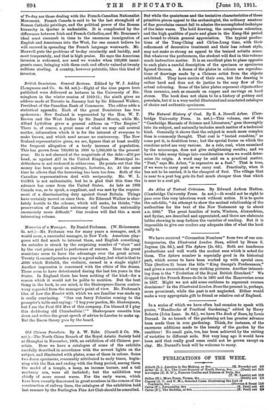British Dominions. General Reviews. Edited by W. J. Ashley (Longmans
and Co. 6s. 6d. net.)—Eight of the nine papers here published were delivered as lectures in the University of Bir- mingham in the winter session of 1010-11; the ninth gives an address made at Toronto in January last by Sir Edmund Walker, President of the Canadian Bank of Commerce. The editor adds a statistical appendix. Each of the great Dominions has two spokesmen : New Zealand is represented by the Hon. W. P. Reeves and the West Indies by Sir Daniel Morris, while Mr. Alfred Lyttelton gives a general address on "The Empire." There is, of course, a great mass of what we may call neutral matter, information which it is for the interest of everyone to make known, and which need arouse no controversy. The New Zealand representative gives, we see, figures that at least modify the frequent allegation of a tardy increase of population. This has grown from 700,000 in 1896 to 1,000,000 in the present year. lie is not alarmed at the magnitude of the debt—£76 per head, as against £17 in the United Kingdom. Municipal in- debtedness is not reckoned in either case. He points out that the money has been spent on railways, factories, &c. At the same time he allows that the borrowing has been too free. Both of the Canadian representatives deal with reciprocity. Mr. W. L. Griffith is not enthusiastic, but he is glad that this time the advance has come from the United States. As late as 1892 Canada was, so to speak, a suppliant, and was met by the require- ment of a discriminating duty against Great Britain. Things have certainly moved on since then. Sir Edmund Walker is abso- lutely hostile to the scheme, which will make, he thinks, "the preservation of Canadian autonomy and Canadian nationality enormously more difficult." Our readers will find this a most interesting volume.










































 Previous page
Previous page